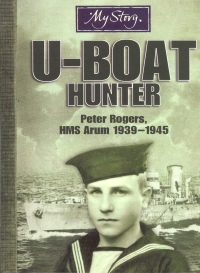| ________________
CM . . .
. Volume XIV Number 3 . . . .September 28, 2007
excerpt:
Young readers interested in sea stories will happily pick up this volume that traces the story of a young British sailor's life at sea during World War II and the six year Battle of the North Atlantic, which was vital to the survival of Britain and the eventual defeat of Nazi Germany. Although the characters are fictional, many of the actions occurring in the book are based on factual events, and they give the book a realistic flavour. The book also contains a glossary of naval terms, a timeline of significant events in the Battle of the North Atlantic and a six page Historical Note that nicely encapsulates the importance of the battle to the eventual victory over Nazi Germany. The hero, young Peter Rogers, was from a sea-faring family, and, when war broke out in 1939, he immediately enlisted in the Royal Navy. He was posted to the corvette HMS Arum, a ship assigned to hunt German U-boats which were sinking merchant ships sailing from North America to Great Britain. Peter is hurriedly introduced to all aspects of life on a British warship: the vital jobs each officer and sailor must diligently carry out to keep the ship operating smoothly and safely; how the ships submarine detection and weapons work, and how the convoy system protected the defenseless merchant ships. As the war progressed, the ship's tactics and armaments became more sophisticated; the crew had to adapt to new ways of fighting the enemy. Peter develops into a competent sailor and dreams of making a life for himself at sea after the war. He learns to adapt to a way of life that was totally different from his safe and secure middle-class upbringing His companions on the ship are a mixed lot that came from all parts of England, and some, he soon discovers, have deep secrets they want to keep hidden from shipmates and officers. He learns that war is a terrible thing that demands courage and cold-blooded determination but does not exclude honour and humanity. He came on the ship an innocent boy but rises to the challenges of growing up in a dangerous environment. He never loses touch with the solid values instilled by his parents. In this, he symbolizes those of our parents' and grandparents' generation who lived through those horrible years without becoming embittered by them. Recommended. Ian Stewart teaches at David Livingstone School in Winnipeg, MB.
To comment
on this title or this review, send mail to cm@umanitoba.ca.
Copyright © the Manitoba Library Association. Reproduction for personal
use is permitted only if this copyright notice is maintained. Any
other reproduction is prohibited without permission.
NEXT REVIEW |
TABLE OF CONTENTS FOR THIS ISSUE
- September 28, 2007.
AUTHORS |
TITLES |
MEDIA REVIEWS |
PROFILES |
BACK ISSUES |
SEARCH |
CMARCHIVE |
HOME |
